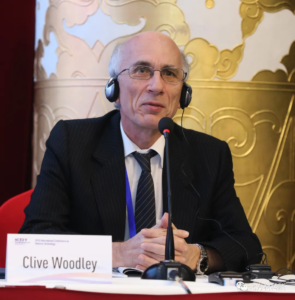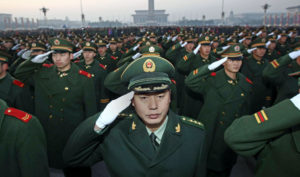The city of Xi’an was once famed as the birthplace of the Silk Road, the tortuous trade route along which caravans bore textiles, jade and other luxury products to Persia, Egypt and Europe for more than 1,500 years. Just outside the city lies another ancient marker of its erstwhile wealth and power: the Terracotta Army buried in the vast underground necropolis that contains the tomb of China’s first emperor, Qin Shi Huang.
Today, the capital of Shaanxi Province has another source of renown: its armaments research and manufacturing hub, which serves the burgeoning strategic requirements of Qin’s distant successor, President Xi Jinping. The Xi’an Aircraft Industrial Corporation builds many of China’s bombers and assault planes, and the city houses four separate universities where staff conduct defence and weapons research.
Appropriately enough, then, starting on 23 September, Xi’an’s cavernous Quijang Convention Centre will play host to a high-profile four-day meeting, the fourth International Conference on Defence Technology (ICDT), at which some 2,000 scientists will discuss the latest research into ways of making weapons more deadly. The conference will examine work in highly sensitive fields that are already transforming the way nations wage war, and its considerable cost will be met by China’s weapons industry. Unsurprisingly, most of the delegates will be Chinese, although two of the listed keynote speakers happen to be citizens of China’s ally, Russia. However, somewhat less predictably, the conference’s co-chair will be a Briton who lives in Kent.
A tall, bald and bespectacled figure in his late sixties, Clive Woodley is one of Britain’s leading weapons technology experts, with much of his own ground-breaking research funded by Britain’s Ministry of Defence. Having worked closely with Chinese colleagues for at least a decade, he is set to play a central role in Xi’an; indeed, he is the author of the ICDT’s welcome message encouraging other scientists to attend the conference. The conference, he writes, will “allow exposure to the most current state-of-the-art technology in defence science”, and “provide opportunities for interactions with some of the world’s leading experts in the field”.
He goes on to explain how “new topics have been added which are at the frontiers of defence science and technologies, including hypersonic technology, artificial intelligence, directed energy, optoelectronics, stealth technologies, and electronic countermeasures”. Also promised are sessions on “explosions and impacts”, “armour and protection”, “advanced launch technology”, and quantum computing.
The full conference programme has not yet been issued, but the list of keynote speakers reveals an interesting array of expertise. Joining Woodley as co-chair will be Professor Baoming Li of the Nanjing University of Science and Technology — one of the “seven sons of national defence”, a group of Chinese universities which are especially close to the military. Baoming Li is also a high-ranking member of the Communist Party, and the Principal Scientist of the China Academy of Ordnance Science.
Elsewhere, accompanying Woodley will be at least one British colleague — Anthony Vickers, emeritus professor of computer science and electronic engineering at the University of Essex, who has published research on both lasers and quantum computing. (Like Woodley, Vickers did not respond to requests for comment.) Other keynote speakers listed to appear include scientists from Germany, Singapore and South Africa.
It’s not hard to see why Woodley tops the bill. His international stature as a scientist, and his long, close relationship with Britain’s Ministry of Defence, grant heft to his presence and add to the prestige of the ICDT. Having worked directly for the MoD after graduating from the University of Southampton in 1978, he went on to spend 17 years as Principal Scientist at Qinetiq, the MoD-controlled defence and security firm created when the Ministry privatised its laboratories in 2001. After leaving Qinetiq in 2018, he joined the Department of Shock Physics at Imperial College, London, where he stayed until 2022. He also served for several years as president of the International Ballistics Society, which has thousands of members across the globe. He remains the chair of its membership committee.
But what does this mean in practice? Well, according to his online biography, issued by the Chinese publisher of Defence Technology, a journal that Woodley co-edits and is closely linked to the ICDT, he is a “world expert on the mathematical modelling of the internal ballistics of guns”, who has “contributed to many of the gun systems used by the UK Armed Forces”. He has, it adds, also provided “critical insight” into the behaviour of explosives, and devised “innovative numerical modelling techniques” that have enabled the development of next-generation hypersonic artillery weapons such as railguns, whose shells are propelled not by conventional explosives but by electromagnetic pulses — weapons in which China appears to have developed a decisive lead.
Woodley insists that his involvement with the ICDT and his broader relationship with China is innocuous. While he declined to speak to me, he recently announced on LinkedIn that he is looking forward to an “impressive lineup of over 100 presentations and papers”, saying the conference will serve “as a conduit for the exchange of ideas, fostering collaboration”. (He also writes that he is “really looking forward” to staying at the five-star conference hotel, the Xi’an South Ramada Plaza by Wyndham, which “looks very comfortable”, and where he hopes “the breakfasts are good”.)
Yet not all are so blasé about his involvement. According to Charles Parton, formerly a Foreign Office China-watcher who spent several years stationed in Beijing, his presence in Xi’an is “extraordinary”. The only purpose of the ICDT, he told me, is to “attract people with his sort of experience to China in order to share that experience with China”. Moreover, “any usefulness which the Chinese can extract from his participation will be relayed into Chinese weapons programmes”, and if they believed his presence were not invaluable, “they would not have invited him” — and the weapons that China is trying to enhance “are intended for use against the UK’s allies, and even possibly in the unforeseeable future against UK forces”.

Parton’s assessment is supported by sources in China. In 2018, when Woodley co-chaired the first ICDT, the China Daily reported that it would “let China’s scientific researchers come into close contact with outstanding foreign scientists in the field of defence technology without leaving the country, conducting in-depth exchanges and gaining insight into the work being done on international academic frontiers in the field of defence”.
What this meant in practice became clearer in 2022. After that year’s ICDT in Beijing, Sun Zhuzhu, a young Chinese scientist based at Baoming Li’s university in Nanjing, posted a report on the event in Mandarin on his department’s website, saying that thanks to the “insights in the international academic frontiers in the field of defence” provided at the conference, it had “served the innovative development of [the Chinese] weapons industry”. He continued: “Not only is the gap between our product and technology level and the advanced level of foreign countries getting smaller and smaller, the influence of international defence technology is also increasing rapidly.” If any clarification was needed, he emphasised that the aim was for China to “truly grow into a scientific master”.
As UnHerd readers will know, Woodley’s involvement stretches back well beyond that conference. In May 2022, I drew attention to his appearance the previous October at a conference devoted to “New Material Technology for Ammunition” in Jinan, the capital of China’s Shandong province. According to the subsequent official Chinese report, the event “marked a new chapter in the development of artillery, shells and missiles”. Just a few weeks later, the MI6 chief Richard Moore gave a speech warning that the threats posed by China had become his agency’s “greatest single priority”, warning of “large-scale espionage operations against us, targeting those in research of particular interest to the Chinese state”.
I also revealed that, between 2014 and 2022, Woodley travelled to China to participate in seminars and lectures with senior defence figures and academics at least seven times. He had also published eight research papers either in Chinese journals or written jointly with Chinese scientists who worked for Chinese weapons firms.
Of course, when Woodley’s relationship with China began in 2014, Anglo-Chinese relations were still basking in the “golden age” inaugurated by David Cameron and George Osborne when Xi visited Britain in 2012. It took years for its warm glow to cool: it was not until 2020 that Britain decided it had to eradicate equipment made by the Chinese firm Huawei from its 5G phone networks on grounds of national security. In 2014, there had been no Uighur genocide, and the basic rights of Hong Kongers had not been crushed.
But if it was clear that the geopolitical landscape had shifted in 2022, the evidence is now impossible to ignore. “Xi Jinping has become even more authoritarian, the threat to Taiwan is greater than ever, and China is backing Putin’s brutal campaign in Ukraine,” says Professor Anthony Glees, the founder of the University of Buckingham’s Institute for Intelligence and Security Studies.
Indeed, the ICDT’s main sponsor, the China North Industries Corporation (Norinco), a manufacturing giant whose products include military jet aircraft, drones, artillery guns, shells, mortars, missiles, bombs, small arms, radar and anti-aircraft guns, has reportedly shipped guns and other military equipment to Russia for use against Ukraine. Having first been sanctioned by the US in 2003 for selling missile technology to Iran, Norinco fell within the scope of President Biden’s 2021 Executive Order prohibiting Americans from doing business with what he termed China’s “military industrial complex”. Woodley himself appears to realise how much things have changed. The futuristic technologies that will be discussed in Xi’an, he said in a recent LinkedIn post, are now “very topical, given events worldwide”.
Yet for now, the new British government appears just as reluctant to criticise, let alone block, Woodley’s involvement with the Chinese weapons industry as its Conservative predecessor — despite a Labour manifesto pledge to conduct an immediate “review” of UK relations with China. Last week, when I asked the MoD to comment on Woodley’s trip to Xi’an, its spokesperson replied with an emailed statement: “We have robust procedures in place to make sure research contracts do not contribute to overseas military programmes and that individuals or organisations with foreign-state links cannot access our sensitive research.” Somewhat disappointingly, the statement was a verbatim replica of the statement the MoD issued when I asked about Woodley two years ago.
Others are more forthright. According to Glees, “on the face of it, Woodley’s behaviour is astonishing”. It is, he says, just possible that Woodley has been a British intelligence asset all along, tasked with penetrating China’s defence establishment. But if this is so, none of the several sources from Britain’s defence and intelligence communities with whom I have consulted has made any suggestion that this might be the case.
Meanwhile, a curious stipulation set out on the ICDT website appears to support the fear that the direction of traffic in sensitive knowledge taking place in Xi’an will be strictly one way. Chinese scientists who wish to submit papers must sign a declaration that none of their contents is classified, and that they have obtained approval from the “comrades” in their department’s “confidentiality unit”. Scientists from abroad, however, are not bound by this rule. Should they wish to divulge, the ICDT will not stand in their way.
Speaking on condition of anonymity, a former Whitehall security official with long experience of trying to stop the transfer of sensitive technology to potentially hostile powers says that while Woodley has done nothing unlawful, he appears to be disregarding “ethical and moral norms”. His apparent impunity, the former official says, will only make it more difficult to stop other military experts from sharing their knowledge with China, while Russia’s involvement with the ICDT makes it still more dangerous: “In my view, what he is doing does not align with Western interests.”
Disclaimer
Some of the posts we share are controversial and we do not necessarily agree with them in the whole extend. Sometimes we agree with the content or part of it but we do not agree with the narration or language. Nevertheless we find them somehow interesting, valuable and/or informative or we share them, because we strongly believe in freedom of speech, free press and journalism. We strongly encourage you to have a critical approach to all the content, do your own research and analysis to build your own opinion.
We would be glad to have your feedback.
Source: UnHerd Read the original article here: https://unherd.com/



